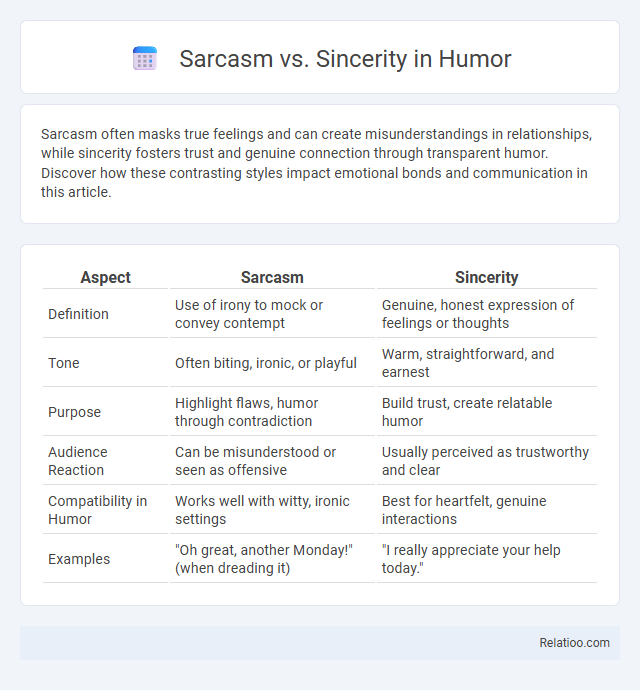Sarcasm often masks true feelings and can create misunderstandings in relationships, while sincerity fosters trust and genuine connection through transparent humor. Discover how these contrasting styles impact emotional bonds and communication in this article.
Table of Comparison
| Aspect | Sarcasm | Sincerity |
|---|---|---|
| Definition | Use of irony to mock or convey contempt | Genuine, honest expression of feelings or thoughts |
| Tone | Often biting, ironic, or playful | Warm, straightforward, and earnest |
| Purpose | Highlight flaws, humor through contradiction | Build trust, create relatable humor |
| Audience Reaction | Can be misunderstood or seen as offensive | Usually perceived as trustworthy and clear |
| Compatibility in Humor | Works well with witty, ironic settings | Best for heartfelt, genuine interactions |
| Examples | "Oh great, another Monday!" (when dreading it) | "I really appreciate your help today." |
Understanding the Essence: Sarcasm and Sincerity Defined
Sarcasm in humor involves using irony or sharp wit to convey contempt or ridicule, often relying on tone and context for interpretation. Sincerity in humor reflects genuine, heartfelt expressions that evoke laughter through relatability and authenticity without hidden meanings. Understanding these distinctions enhances comprehension of humor's impact on social interactions and emotional responses.
Historical Perspectives on Humor Styles
Historical perspectives reveal that sarcasm has been used as a sharp tool for social critique, often reflecting wit and intelligence, while sincerity in humor emphasizes genuine emotion and connection. Humor styles evolved from classical Greek satire to Renaissance jesters, highlighting shifts between biting sarcasm and heartfelt sincerity. Understanding your preference for sarcasm or sincerity in humor can deepen appreciation of cultural and historical contexts shaping comedic expression.
Psychological Impact: How Sarcasm and Sincerity Affect Audiences
Sarcasm often triggers a mix of amusement and confusion, engaging the audience's cognitive skills to decode underlying meanings, which can foster a sense of complexity but also risk misunderstanding and emotional distancing. Sincerity in humor promotes trust and emotional connection by delivering clear, heartfelt messages that resonate deeply with listeners, enhancing positive social bonds and reducing the chances of offense. Your choice between sarcasm and sincerity directly influences the psychological impact on your audience, shaping their emotional responses and perception of your intent.
Cultural Differences: Sarcasm vs Sincerity in Global Humor
Cultural differences shape the perception of sarcasm and sincerity in humor, with Western cultures often embracing sarcasm as a form of wit, while many Asian cultures prioritize sincerity and directness to avoid misinterpretation. In global humor contexts, sarcasm may be seen as offensive or confusing where linguistic cues are less familiar, impacting cross-cultural communication. Understanding these nuanced preferences enhances effective humor usage in international settings.
Communication Dynamics: Clarity and Misinterpretation
Sarcasm relies on tone and context, often causing clarity issues and increasing the risk of misinterpretation in communication, whereas sincerity in humor fosters direct understanding and positive emotional exchange. The ambiguity inherent in sarcastic remarks can lead to misunderstandings, especially in diverse cultural or social settings. Effective humor communication balances clarity and emotional nuance, minimizing misinterpretation while maintaining engagement.
Benefits and Pitfalls of Sarcastic Humor
Sarcastic humor often enhances social bonding by providing a sharp, witty edge that stimulates intellectual engagement and emotional release. However, it risks misinterpretation, potentially causing offense or alienating individuals who may perceive it as insincerity or hostility. Balancing sarcasm with sincerity in humor fosters inclusivity and positive connection while maintaining the playful and critical aspects of comedic expression.
The Power of Sincere Comedy: Relatability and Connection
Sincere comedy harnesses genuine emotions and relatable experiences to build authentic connections with Your audience, fostering empathy and deeper understanding. Unlike sarcasm, which can create distance or confusion, sincere humor invites shared vulnerability and trust, making laughter a bridge rather than a barrier. This approach enhances the impact of humor by grounding it in truth and human connection.
Context Matters: Choosing the Right Humor for the Moment
Sarcasm and sincerity in humor serve distinct purposes, with sarcasm often delivering sharp wit or critique, while sincere humor fosters genuine connection and warmth. Understanding the context, including the audience's mood and setting, is crucial to choosing the right type of humor that resonates without offending. Your ability to gauge these factors ensures your humor enhances communication and strengthens relationships effectively.
Media and Pop Culture: Sarcasm and Sincerity in Entertainment
Sarcasm and sincerity shape the entertainment landscape by influencing how humor is perceived and enjoyed in media and pop culture. Sarcasm often delivers sharp, ironic commentary that engages audiences through wit, while sincerity fosters genuine emotional connections, enhancing relatability and warmth in storytelling. Your understanding of these distinct humor styles can enrich your appreciation of diverse entertainment genres and character dynamics.
Finding Balance: Blending Sarcasm and Sincerity for Effective Humor
Finding balance between sarcasm and sincerity in humor enhances its effectiveness by engaging audiences through sharp wit while maintaining emotional authenticity. Sarcasm delivers irony and sharpness that can provoke thought or laughter, while sincerity fosters connection and relatability, creating a dynamic interplay that resonates deeply. Blending these elements skillfully allows humorists to navigate social nuances, making their message both entertaining and meaningful.

Infographic: Sarcasm vs Sincerity in humor
 relatioo.com
relatioo.com